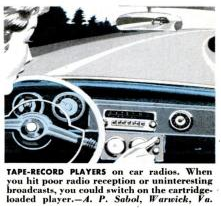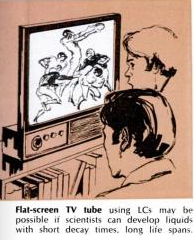Technology
Weird Science - Towel Folding Robot
Judging by the huge response to what I thought was a fairly large and obscure post about a tiny coincidence, the Hitchhiker's Guide and cutting-edge science is obviously a winning combination.So here is a super special Douglas Adams bonus, a robot folding towels! Okay so that's a bit of a stretch, but it is still quite cool.
Note that this video has been speeded up 50x, in real time it took the robot over an hour and a half to complete this one task. Perhaps it was feeling a little depressed?
Posted By: Dumbfounded - Sat Apr 17, 2010 -
Comments (25)
Category: Boredom, Futurism, Inventions, Robots, Science, Experiments, Technology
Just Imagine!
I can almost believe that I myself, starting from scratch and given several years, might be able to handcraft the 433 parts of a 1940s phone and assemble them into a working unit.
But how could I build the billion-dollar computer-chip fabrication plant in order to create one chip or hard-drive for an iPhone?
Posted By: Paul - Fri Mar 12, 2010 -
Comments (14)
Category: Technology, Cartoons, Documentaries, 1940s
A Little Light Weirdness – 9

And it's not just the the British, military officials in Russia recently discovered 100 front-line battletanks parked and forgotten by the side of the road near Yekaterinburg in the Urals. Locals say the tanks, which were unguarded and unlocked, have been there for several months and lack only ammunition and the all important starter keys (Reuters).
Someone who might have had a use for those tanks were guests at a wedding in New Delhi in India recently. The Hindu ceremony was somewhat marred when an elephant hired for the event went on a rampage after becoming aroused by the smell of a nearby female in heat. The amorous pachyderm then proceeded to crush 20 limousines, smash through a nearby mall and mount a truck before it could be tranquilised (Orange).
Also losing it this week was the man on the RyanAir flight who found he had won 10,000 euros on a scratchcard he bought on the budget flight from Poland to the UK. Furious that the airline had not seen fit to equip all their planes with the requisite amount of cash onboard, hence he could not be given his prize there and then as he demanded, the unnamed passenger ate the winning card rather than wait to claim it at his destination (BBC News).
More in extended >>
Posted By: Dumbfounded - Sun Mar 07, 2010 -
Comments (7)
Category: Armageddon and Apocalypses, Awards, Prizes, Competitions and Contests, Ceremonies, Weddings, Destruction, Disasters, Government, Law, Lawsuits, Military, Motor Vehicles, Technology, Goofs and Screw-ups
More Theremin
Posted By: Paul - Thu Feb 25, 2010 -
Comments (3)
Category: Music, Technology, Outsider Art
The Internet, 1937-style
Posted By: Paul - Sat Jan 02, 2010 -
Comments (2)
Category: Technology, 1930s
Follies of the Mad Men #80
Nothing says Xmas like....?
Posted By: Paul - Wed Dec 23, 2009 -
Comments (6)
Category: Holidays, Sexuality, Technology, Toys, Advertising
Ahead of its Time #1
Of course, not everyone had bad ideas in those old issues of Popular Science. Many of the ideas for new products were quite brilliant. This series will look at ideas that were ahead of their time. Today's lesson: In Car Tape Deck.

(from the March 1954 issue of Popular Science)
For a little background, the modern tape recorder came about in 1939, but it wasn't refined enough for commercial use until the late 1940s. Reel to reel tape recorders started to become common home recording machines in the mid 1950s and as a professional home audio format in the late 1950s. The first automobile tape player was the Muntz Stereo-Pak of 1962 which evolved in the Lear Jet Stereo 8 (better known as 8 Track) in 1964. Even so, 8 track players didn't become common in cars until the late 1960s, so unfortunately A. P. Sabol had another fifteen years to wait before his request was answered...
Posted By: Salamander Sam - Thu Nov 12, 2009 -
Comments (7)
Category: Technology, 1950s, Cars, Yesterday’s Tomorrows
Game Over
PES is an animation company that makes, well, "unique" stop motion short films, most of which feature only every day objects. Check out their other videos at their websiteOasis of the Seas
A cruise ship that holds "6,360 passengers and 2,160 crew"...? Now, that's pretty weird.Read about the launch of the ship here. Then watch the official promotional video.
Posted By: Paul - Mon Nov 02, 2009 -
Comments (13)
Category: Oceans and Maritime Pursuits, Recreation, Technology, Travel, Sightseeing, World Records
They Had That Back Then? #3
Today's lesson: Flat Screen TV (this is a long one to make up for not posting anything in a while).
From the February 1972 issue of Popular Science.
More in extended >>
Posted By: Salamander Sam - Sat Oct 31, 2009 -
Comments (9)
Category: Technology, Television, 1960s, 1970s, 1980s

| Who We Are |
|---|
| Alex Boese Alex is the creator and curator of the Museum of Hoaxes. He's also the author of various weird, non-fiction, science-themed books such as Elephants on Acid and Psychedelic Apes. Paul Di Filippo Paul has been paid to put weird ideas into fictional form for over thirty years, in his career as a noted science fiction writer. He has recently begun blogging on many curious topics with three fellow writers at The Inferior 4+1. Contact Us |




